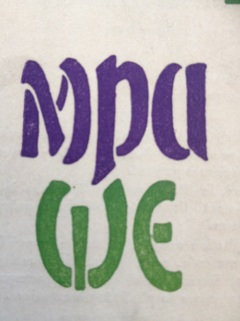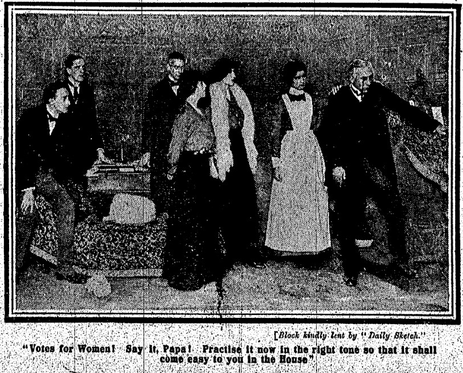2. Male support for Votes for WomenIn the film 'Suffragette' the character of Hugh Ellyn, played by Finbar Lynch, is described by the policemen watching his property as being part of the 'Men's League.' Married to a known militant, he has apparently previously been imprisoned for his role in the suffrage campaign, and we see him in the film helping the WSPU to organise and carry out violent militant actions. Although we never get to hear any of his story, it's good to have acknowledgement of the male support for suffrage in the film - as it's an important part of the history of the campaign. It's not made clear in the film or production notes, but I reckon, given his militant leanings, Lynch's character is most likely to have been part of the Men's Political Union for Women's Enfranchisement (MPU). The MPU was directly affiliated with the WSPU, the society featured in the film 'Suffragette,' and shared their colours of purple, white and green. As well as their headquarters near Charing Cross Station in London, they had a number of regional branches across the UK, including in Eastbourne, Birmingham and Letchworth and at both Oxford and Cambridge Universities. One branch, in East Grinstead, was apparently "actually the outcome of an anti-suffrage meeting there... One gentleman was so struck with the feebleness of the arguments that he proceeded to found a branch of the Men's League." I first came across them in my research because of their role in the WSPU 1911 Christmas Fair, where they ran the ‘Fun of the Fair’ section of the event that included a Roundabout, Hoopla, and a Shooting Gallery. This Shooting Gallery was run jointly with the Croydon branch of the WSPU and was advertised as where "Suffragists and Anti-Suffragists alike can try their skill with an air-gun" so that participants "will realise that muscular force is not the basis of all Government or even of all fights... but that skill and determination have to be taken into account." The entertainments also included Suffrage Shies, a Suffrage Punch and Judy show written by Inez Bensusan, a member of the Actresses' Franchise League, and a magic show performed by one of the founder members of the Magic Circle. You can read more about that magician in my blog post here. The role of pro-suffrage men in the suffrage movement is often underplayed, but male support for the cause was prominent. The Suffrage Annual and Woman’s Who’s Who, published in 1913, lists a total of 46 suffrage societies across the UK and Ireland. Angela V. John and Claire Eustance's excellent book The Men’s Share? Masculinites, Male Support and Women’s Suffrage in Britain, 1890-1920 (London: Routledge, 1997) lists eleven known suffrage societies with male only membership, four societies with religious affiliations known to have had male support, and a further eighteen predominantly female societies with known male involvement. In one of the MPU's annual reports, three UK based societies - The Men's League, The Men's Political Union and The Men's Federation for Women's Suffrage - are listed as being part of the Men's International Alliance for Woman Suffrage, alongside with societies in Europe and America. There's also an advert for a Men's League monthly paper, with articles by suffragist writers. You can find out more about suffrage newspapers via my BBC Arts piece here. My own research into the theatrical support for the suffrage cause has shown that men were active within the Actresses' Franchise League as writers, producers, managers and performers. Actor managers like Johnston Forbes-Robertson, husband of the League's president Gertrude Elliott, and Lewis Casson, husband of actress Sybil Thorndike, regularly spoke on suffrage platforms, whilst playwrights, poets and journalists like Laurence Housman and Israel Zangwill created new material for performance that spoke directly to the concerns of suffrage campaigners. Forbes-Robertson and Zangwill were both vice-presidents of the Men's League for Women's Suffrage, whilst Housman was on the Committee of the MPU. There's another link here with 'Suffragette' - and it's to do with laundries. Joan Dugdale's play 10 Clowning Street was performed for the MPU at the Cosmopolis Hall in Holborn on 16th December 1913. Both Joan and her sister Una were members of the WSPU and had been imprisoned for militancy, and Una's husband, Victor Duval, who had founded the MPU in 1910, appeared in the cast.
In the play, an anti-suffragist Prime Minister sends his three daughters out into the 'real world' to get jobs, convinced that all suffrage campaigners are just single women needing distraction through work to stop them agitating for the vote. Whilst the first daughter goes to work as a parlourmaid and the third as a shop girl, the second daughter, Judith, is sent to work in a laundry - like the character of Maud in the film 'Suffragette.' Previously an anti-suffragist like her father, Judith returns home radicalised to both suffrage and socialist politics: "What do you know about women's work and its conditions?... It's opened my eyes; taught me what women have to go through when they're not sheltered behind padded front doors like ours... To see those women having all the life taken out of them... wrung out, mangled, and sweated, at three and four shillings a week! Do you know they go there at seven, and don't come out till eight or nine in the evening sometimes, and then they are so tired, they hardly have the energy to crawl home... I never knew such things existed." She also mentions that the suffragettes have been holding meetings outside the laundry, as we see in the film. Both her sisters return home in horror at the working conditions, pay and treatment of ordinary women - and demand that their father change his views. Unlike many suffrage plays, 10 Clowning Street doesn't resolve with a change of heart from a previously unsympathetic character in the face of overwhelming evidence and logical argument. Instead, the Prime Minister eventually agrees to support the Votes for Women campaign, not because he is moved by hearing his daughters describe their experiences, but because they threaten to turn to militancy in order to make their point, and he doesn't want the bad publicity that would accompany that. It's not surprising that Dugdale's play is cynical, given her experiences of campaigning. Then, as now, it seemed obvious to new converts to the cause that if only politicians and law-makers knew and understood the realities of the lives of ordinary women and men then they could not help but change unequal legislation that harmed them. Dugdale, Duval, the WSPU and MPU knew that that was not the case - that politicians had to care, not just know, and be persuaded by all means necessary to take the concerns of their constituents seriously, in spite of the internal pressures of political parties and the hierarchies of Government and office. 10 Clowning Street is just one of the suffrage plays that deals directly with issues affecting working women - and highlights Dugdale's frustration at the detachment and disinterest of many politicians from the realities of women's lives. The full text of the play was printed in Votes for Women a week after the performance. Thanks to the wonder that is Google newspapers, you can read it here - it's on pages 186-188. I was really glad to see a positive and pro-suffrage male character in the film, although - SPOILER ALERT! - it's a shame that his support and respect for his wife's independent political agency wavers at the end. And as the fight for equality is still ongoing, here are some marvellous organisations are worth your support... The White Ribbon Campaign is for men who campaign against violence against women - click here to find out more Men are also welcome as members of the Women's Equality Party - click here to find out more Sign the 50:50 Parliament petition for better gender balance in Parliament - click here to find out more
1 Comment
|
NaomiThoughts, reflections, bits of research Archives
April 2023
Categories
All
|


 RSS Feed
RSS Feed